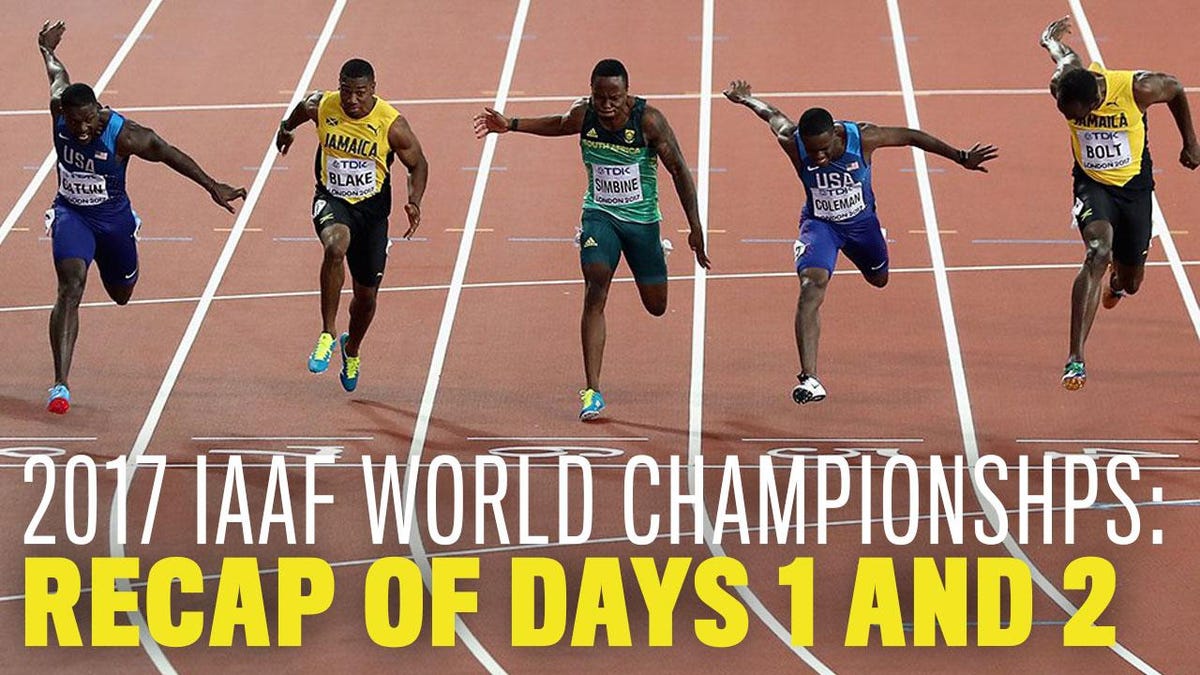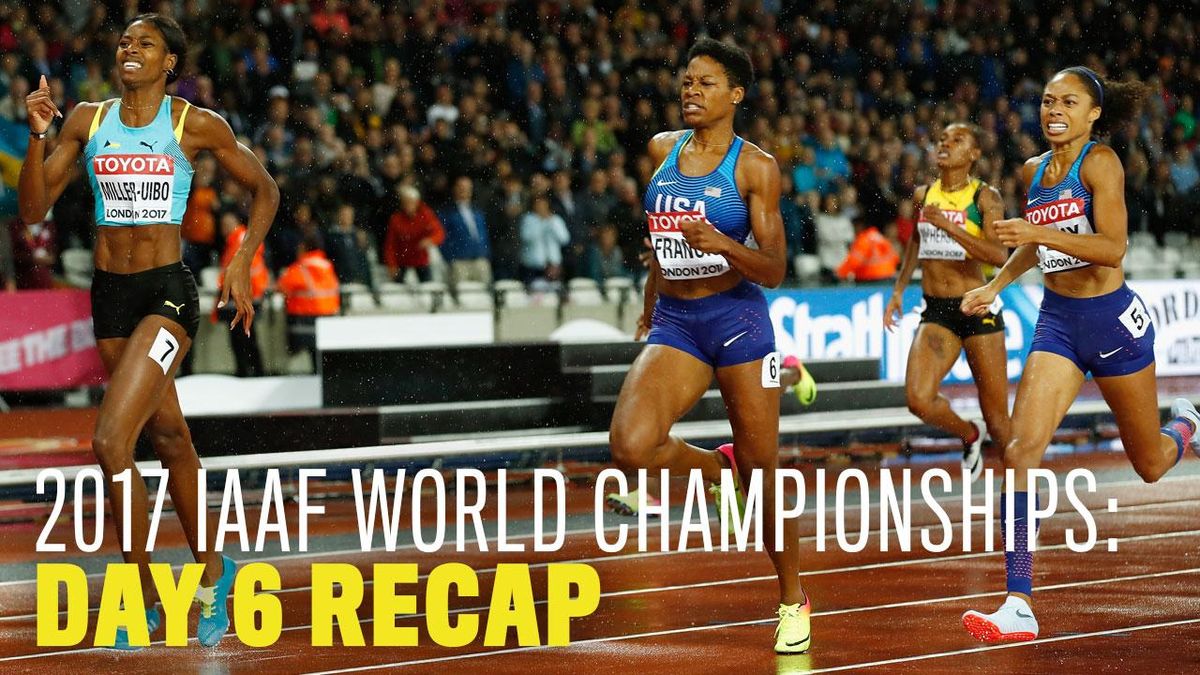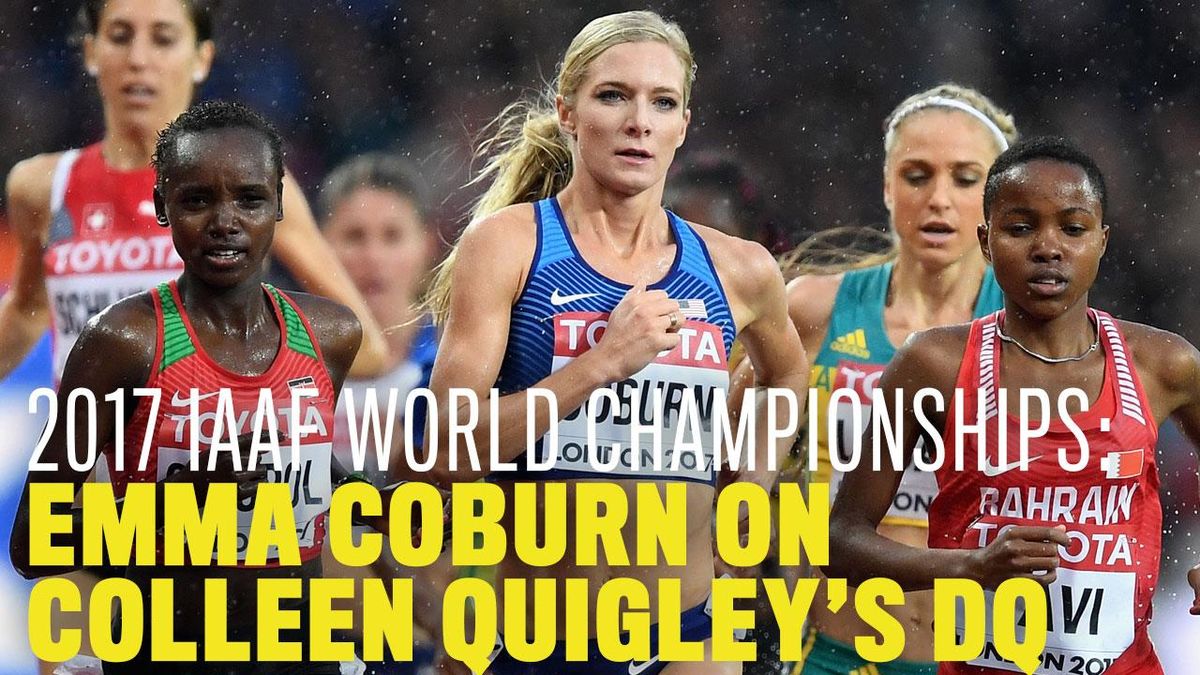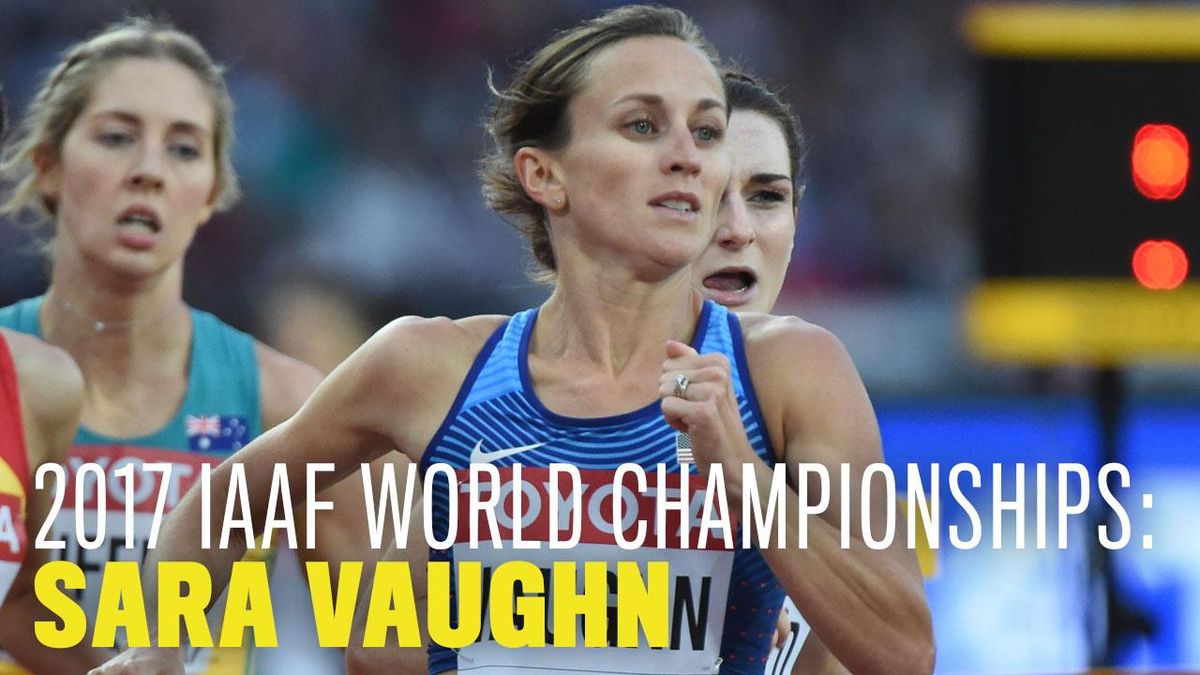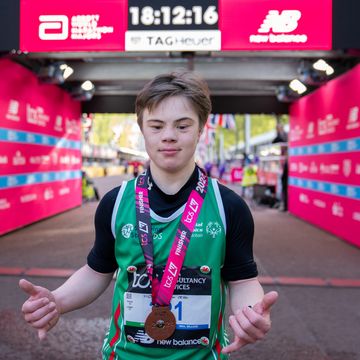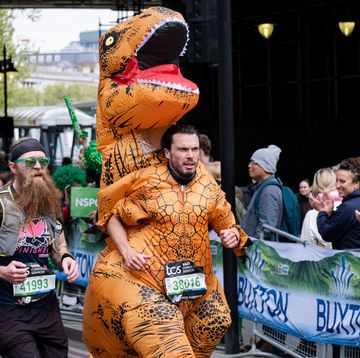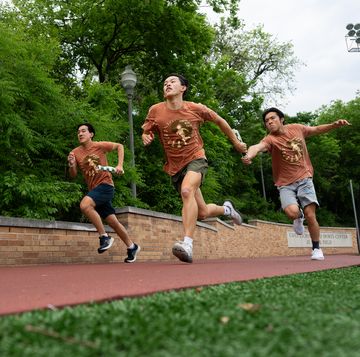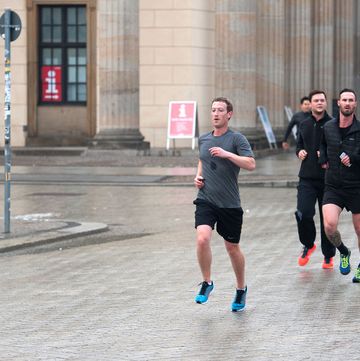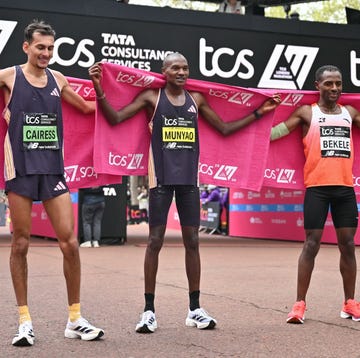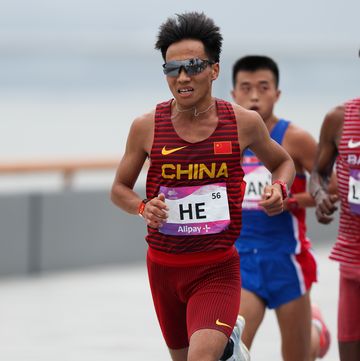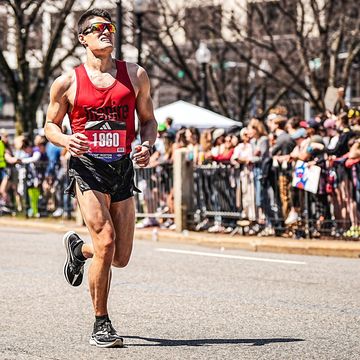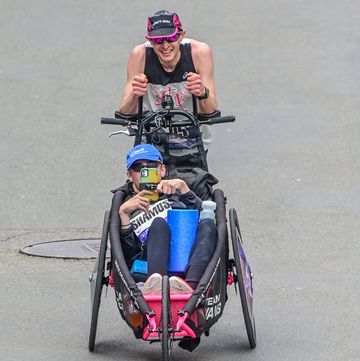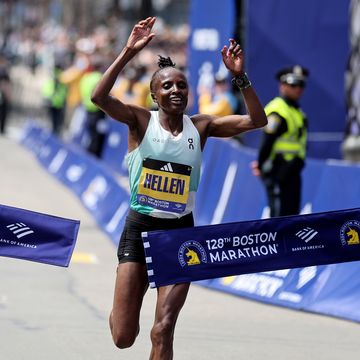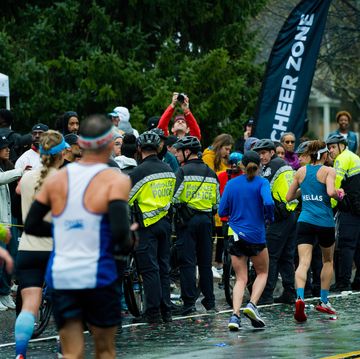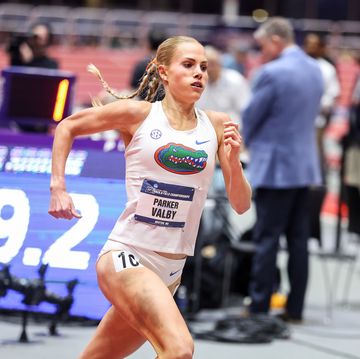The top track and field athletes are gathered in London from August 4–13 to compete at the 2017 IAAF World Championships. The meet takes place at Queen Elizabeth Olympic Park, where the 2012 Games were held.
On tap? Beyond the guaranteed competitive drama, the itinerary includes Mo Farah’s last world championships races on the track, before he focuses full-time on road racing. Usain Bolt’s final 100-meter sprint, before his announced retirement from the sport. Evan Jager’s quest for steeplechase gold. In a first-of-its-kind ceremony, Kara Goucher will be awarded a silver medal for the 10,000 meters at the 2007 world championships—an upgrade from bronze after an athlete tested positive for performance-enhancing drugs in a reanalysis of her sample, along with other runners receiving reallocated awards.
During the 10 days of competition, catch up each day’s action here:
Sunday, August 13
Obiri Unleashes unbelievable kick for gold.
Hellen Obiri, the 2016 Olympic 5,000-meter silver medalist from Kenya, won her first world title on Sunday in the final day of competition in London. When Almaz Ayana, who won the 10,000 meters last week, broke away from the field, Obiri was the sole competitor to go with her. With 300 meters to go, Obiri turned on all the burners, leaving Ayana behind for good in a blistering 61-second last lap, according to the NBC analysts.
Obiri finished in 14:34.86, Ayana was second in 14:40.35, and Sifan Hassan was third in 14:42.73.
Americans Shannon Rowbury (14:59.92), Molly Huddle (15:05.13), and Shelby Houlihan (15:06.40) were ninth, 12th, and 13th, respectively.
Ajee’ Wilson wins bronze, but cannot contain Semenya.
In an exhilarating women’s 800-meter race, U.S. record-holder Ajee’ Wilson and Burundi’s Francine Niyonsaba took the lead and cruised around the first lap in 57.98. Reigning Olympic gold medalist Caster Semenya of South Africa stayed in her preferred position, tucked in the middle of the pack, until well into the second lap. Along the backstretch in the second 400, Wilson made a move, surging in an attempt to take the lead. Niyonsaba went with her, and Semenya, realizing that she had ground to make up, followed close behind. With about 100 meters to go, Semenya caught the two leaders and pushed by them on her way to gold in 1:55.17. This is Semenya’s personal best time, achieved after she won bronze in the 1500 meters earlier in the week. Niyonsaba held on for silver in 1:55.92 while Wilson took bronze in 1:56.55.U.S. women take an easy gold in the 4 x 400-meter relay.
What should’ve been a hot race between Jamaica and the United States ended up being a series of victory laps for the American team after Jamaica pulled out on the second lap. The powerhouse team of Quanera Hayes, Allyson Felix, Shakima Wimbley, and Phyllis France beat second-place Great Britain by nearly six seconds, coming through in 3:19.02. This is Felix’s 16th career world championships medal, making her the most decorated track and field athlete, ever.
American men come up short.
There was yet another upset on the track today when the American men’s 4 x 400-meter relay team, going for its seventh straight world title, got edged out by Trinidad and Tobago who took the event in 2:58.12. Great Britain captured bronze in their home stadium.
Two Kenyans and a Norwegian take men’s 1500 meters.
The three Kenyan men in the 1500 meters on Sunday took the field out in a casual 1:01.63 first 400 meters, but it wasn’t Asbel Kiprop, the three-time world champion at the distance, who ended up at the finish first. Elijah Manangoi and Timothy Cheruiyot dueled for the first two medals, with Manangoi ultimately taking gold in 3:33.61 and Cheruiyot earning silver in 3:33.99.
Kiprop, who placed ninth, began to struggle during the bell lap as Filip Ingebrigtsen found his final gear, moving up to third. In a drive for the bronze medal, Ingebrigtsen was shoved over the finish line from behind by a charging Adel Mechall of Spain. The Norwegian rounded out the podium with a time of 3:34.53.
The sole American, John Gregorek, finished 10th in 3:37.56.
Saturday, August 12
Bolt is a DNF in his final track appearance.
It was supposed to be a happy ending: Usain Bolt, 30, making his final appearance on the track, should have anchored the Jamaican 4x100-meter team to a gold medal. But in the latest surprise of this meet that has had many of them, the team from Great Britain won, the U.S. was outrun on the final straightaway, and Bolt ended his career sprawled on the track in anguish. Who knew a race that lasts less than 39 seconds could have so many twists and turns?
The American squad—with Mike Rodgers, Justin Gatlin, Jaylen Bacon, and Christian Coleman—got off well and executed their handoffs smoothly, something that they have not done at the past several global championships. Gatlin looked to have made up the stagger on the backstretch and Bacon handed off to Coleman almost in a dead heat with Jamaica a lane over. But the team from Great Britain was running well and their anchor, Nethaneel Mitchell-Blake, overpowered Coleman, the silver medalist in the open 100 meters a week ago. Great Britain won in 37.47 and the U.S. took silver in 37.52. Japan won the bronze in 38.04.
Meanwhile Bolt, looking for gold to make up for his disappointing bronze in the 100 meters last weekend, took the baton and pulled up lame a few steps into his leg. Within moments, he was lying on track. After the race was over, he turned away a waiting wheelchair and instead limped off with his teammates surrounding him, a shocking end to a golden career.
U.S. women own the 4x100-meter relay.
The American quartet of Aaliyah Brown, Allyson Felix, Morolake Akinosun, and Tori Bowie got the baton smoothly around the track to win the women’s 4x100 in 41.82, a world-leading time. The hometown crowd in London roared for the team from Great Britain, which grabbed silver in 42.12. The Jamaican squad finished third in 42.19.
Harper Nelson grabs silver for the U.S.
Defending Olympic champion Sally Pearson of Australia had an amazing start, which propelled her to victory in 12.59 in the women’s 100-meter hurdles. In what she called a “dog fight” until the end, veteran Dawn Harper Nelson, 33, won silver for the U.S. in 12.63. Pamela Dutkiewicz of Germany took bronze in 12.72, edging American Kendra Harrison, who was fourth.
Farah finishes second in a shocker.
In a world championships that’s been full of upsets, there was one more today as Mo Farah, who has won every world and Olympic 5,000- and 10,000-meter race since 2012, finished second. He lost to Ethiopia’s Muktar Edris, who won in 13:32.79. Farah ran 13:33.22.
At the start of the race, Farah jumped to the front and settled into a slow and steady pace with his countryman Andrew Butchart. For the majority of the race, the pack largely stayed together with Farah in the lead. Teenage phenom Selemon Barega, 17, of Ethiopia was the first to up the tempo, forcing Farah to respond. But it wasn’t until the final 500 meters that he and Butchart made a move. Three Ethiopian athletes plus American Olympic silver medalist Paul Chelimo matched Farah’s closing sprint. In the end, Edris cruised by Farah, and Chelimo fought his way to the finish in 13:33.30, capturing bronze for the U.S.
This was Farah’s final race for a global title on track. He has said he will concentrate on the road racing in the future.
RELATED: Shocker! Mo Farah is Upset in His Final Track Race
Friday, August 11
U.S. goes 1, 2 in women’s steeple.
Emma Coburn and Courtney Frerichs turned back the deepest field in history to take gold and silver in the women’s 3,000-meter steeplechase. Coburn broke her own American record to finish in 9:02.58, which is also a new world championships record. Frerichs took more than 15 seconds off her previous personal best to take silver in 9:03.77 (well under Coburn’s previous American record). Hyvin Jepkemoi of Kenya, the defending world champion, got the bronze in 9:04.03.
The magnitude of Coburn’s and Frerichs’s accomplishment can’t be overstated. Before last year’s Olympics, no American had medaled in the steeplechase since it became a women’s event at global championships in 2005. Even more impressive, in modern times there hasn’t been an event above 400 meters, men’s or women’s, in which Americans have gone 1-2. That Coburn and Frerichs did so in the steeple, usually considered the national pride of Kenya, only adds luster to their medals.
RELATED: Emma Coburn Calls it “The Perfect Race.” U.S. Women Dominate the Steeplechase
The race was unusual from the start. A putative prerace favorite, Beatrice Chepkoech of Kenya, took an immediate lead, but then spaced out as she approached the first water jump and failed to cut inside to approach it. Chepkoech had to backtrack to go over the jump. Although she wound up finishing fourth, she was effectively out of the race after that mishap.
The reigning Olympic champion and world record-holder, Ruth Jebet of Bahrain, started pushing after the first kilometer. She headed a pack of six that included Coburn and Frerichs. Jebet kept the pressure on, upping the pace in the second kilometer. The victims were runners like Celliphine Chespol of Kenya, fastest in the world this year, but not the Americans. (Jebet wound up fifth in 9:13.96.)
Over the last 500 meters, Coburn and Frerichs worked their way toward the front. Jepkemoi led with a lap to go, but couldn’t get away. Coburn and Frerichs are better technical hurdlers than the women they were up against and used that prowess to their advantage when the sprinting started. Coburn came off the last water jump, with less than 150 meters to go, with the least amount of trouble. After the race she said her coach and fiance, Joe Bosshard, told her “be really powerful over that last water jump.”
Frerichs was just behind her, and held off the hard-charging Jepkemoi after the last hurdle. Her prerace advice was even simpler. “My coach told me to just go for it,” Frerichs said.
Schippers repeats as 200 champ.
Dafne Schippers of the Netherlands successfully defended her 2015 title by just holding off Marie-Josee Ta Lou of the Ivory Coast, 22.05 to 22.08. Shaunae Miller-Uibo of the Bahamas, last year’s Olympic 400 champ, got the bronze in 22.15. Miller-Uibo’s medal was a little bit of consolation after her disastrous performance in the 400 final on Wednesday, when she tightened and slowed in the last 50 meters and went from first to fifth.
Americans Deejah Stevens and Kimberlyn Duncan were fifth and sixth, respectively, in 22.44 and 22.59.
Friday, August 11
Middle-distance semifinals mostly go to form.
The men’s 1500-meter semifinals were the usual chaos, with some top contenders, like three-time world champion Asbel Kiprop of Kenya, easily qualifying for Sunday’s final, while others, like his teammate Ronald Kwemoi, failed to advance.
U.S. champion Robby Andrews withdrew from his semi with just more than a lap to go. “My calf seized up on me,” he said afterward. “I’ll be back. Hopefully this is minor.” With last year’s Olympic champion, Matthew Centrowitz, getting knocked out in the first round, Johnny Gregorek will be the sole American in the final.
In the women’s 800-meter semifinals, last year’s Olympic medalists—Caster Semenya of South Africa, Francine Niyonsaba of Burundi, and Margaret Wambui of Kenya—easily advanced to Sunday’s final. U.S. record holder Ajee Wilson and her training partner, Charlene Lipsey, will try to break the trio’s stranglehold on the event.
Thursday, August 10
American women get through to semifinals.
In the women’s 5,000 meters, American athletes Shannon Rowbury, Shelby Houlihan, and Molly Huddle made it through to the semifinals. Huddle, an Olympian and top American in the 5,000, led her heat by nearly 100 meters for the majority of the race but fell away from the lead in the final lap, finishing in 15:03.60 to make it through on time only. Hellen Onsando Obiri of Kenya came out of the day with a top finishing time with 14:56.70.
All three American women made it out of the 800-meter heats. Ajee Wilson won the first heat in a relaxed 2:00.52. Brenda Martinez placed fourth in a fast heat, but made it in on time, which was 2:01.53. Charlene Lipsey placed first in her heat with a time of 2:02.74.
Centrowitz fails to advance.
After a tough season, 1500 meter Olympic gold medalist Matthew Centrowitz finished in a disappointing 3:48.34. He fell off the lead and to the back of the pack in the final 600 meters.
Related: Centrowitz’s Worlds Come to a Frustrating End
But his American teammates advanced to the semifinals on Friday. Despite having a tough turn and sitting in the back of the pack for the majority of the race, Robby Andrew’s blazing finishing kick got him in at 3:43.03 and a qualifying spot. John Gregorek held onto a fast heat and came through the finish in 3:39.62.
Australian runner Luke Matthews ran the top time in 3:38.19. Moving forward, the squad from Kenya will likely dominate.
Kori Carter has a flawless race, wins gold.
American Kori Carter captured the gold medal in the 400-meter hurdle finals, edging out defending Olympic champion and U.S. teammate Dalilah Muhammad. Bronze went to Jamaica’s Ristananna Tracey.
Guliyan rains on van Niekerk’s parade.
In the men’s 200 final, Wayde van Niekerk’s plan to bring gold to South Africa in both the 400 and the 200 was foiled when Turkish sprinter Ramil Guliyev leaned into the finish line and took the top spot in 20.09. Just .02 seconds separated Guliyev and van Niekerk. Jareem Richards of Trinidad and Tobago captured bronze in 20.11. No Americans made the podium.
Wednesday, August 9
Crazy finish produces unexpected champion in the women’s 400 meters.
The women’s 400 meters looked to be a rematch of the Olympic final last year between Shaunae Miller-Uibo of the Bahamas and Allyson Felix of the United States. In Rio last year, Miller-Uibo dove across the line to win gold, and Felix settled for silver.
Today, Miller-Uibo held a big lead heading into the final stretch, with Felix, 31, second. But both were tiring while Phyllis Francis, 25, of the United States and Salwa Eid Naser of Bahrain were closing fast. Miller-Uibo stumbled in the final few steps of the race, and Felix slowed enough to let Francis jolt past her for the win. Francis’s time was 49.92, a new personal best. Eid Naser was second in 50.06.
Felix finished third in 50.08, winning the bronze medal, which brings her total number of individual medals at world championships and Olympics to 11. After the stumble, Miller-Uibo faded to fourth.
Francis was ecstatic after the race. “I was like: Don’t panic, don’t freak out, don’t get too excited. Put your arms down, put your legs down and just keep going,” she said. “I was just telling myself to be patient and go with the flow. Coach said give it all you got, even if you fall on the floor and that’s what I did. Thankfully I didn’t throw up. I only saw myself top three. I surprised myself with what I was capable of doing.”
Felix is not talking about retiring anytime soon and she gave credit to Francis. “I felt in good position coming home and off the last 150, tried to make a move and there was nothing there, just didn’t have it coming home,” she said. “I’m happy for Phyllis. She’s come into her own and it’s awesome to see her as world champion.”
Coburn advances easily to steeplechase final.
Emma Coburn, the American record holder and reigning Olympic bronze medalist in the 3,000-meter steeplechase, finished second in her qualifying heat in 9:27.42 to advance to the final on Friday.
In the first heat, American Colleen Quigley seemed poised to advance after finishing third, but she was disqualified for stepping on the lane line marking the inside of the track after going over a water jump. She appealed the disqualification, but the ruling stood.
“That makes me so sad to see,” Coburn said afterward about Quigley’s DQ. “She truly deserves to be in that final. She’s in the top 12 women in the world consistently. It’s sadly part of the sport, but it’s upsetting.”
Courtney Frerichs, Quigley’s training partner with the Bowerman Track Club in Portland, Oregon, advanced to the final by virtue of a third-place finish in her heat. “I think I can run close to 9:10 in the final,” she said. “For sure under 9:15. That’s been the goal all this year.”
Farah begins quest for 11th consecutive global gold.
In the men’s 5,000 meters, Mo Farah finished second in his heat to advance to Saturday’s final. After his gold medal on Friday night in the 10,000—his 10th in a row at either an Olympics or world championships—Farah needed to expend as little energy as possible getting through. He steered clear of the traffic and crossed the line in 13:30.18.
In the next heat, however, runners weren’t so lucky in the London rain. Early in the race, American Paul Chelimo, the silver medalist from Rio, engaged in some shoving with a Zouhair Aouad of Bahrain. With three laps to go, Chelimo got clipped from behind and fell to the track. He managed to get up quickly, resumed running, and advanced to the final on time. American Ryan Hill also advanced to the final out of the second heat. In the first heat, American Eric Jenkins did not advance.
“It’s really slick out there,” Chelimo said. “I didn’t think it was over [when I fell]. You just have to stand up, get back into it.”
Isaac Makwala makes 200-meter final.
Isaac Makwala of Botswana, one of many athletes in London who has contracted a gastrointestinal virus, was quarantined and could not compete yesterday in the 400 meters, in which he was a medal contender. Today, with his quarantine lifted, he came back fighting in the 200 meters. First, he ran a heat by himself in 20.20 to be allowed into the semifinals. In the semifinals, he was second in his heat in 20.14 to qualify for Thursday’s final.
Tuesday, August 8
Evan Jager takes steeplechase bronze.
In a brave race where he took charge early, Evan Jager, 28, ended up in third place on Tuesday in the 3,000-meter steeplechase. It’s the first time an American man has medaled in the event at the world championships. Jager is also the 2016 Olympic steeple silver medalist.
With five laps left, Jager went to the front and dropped the pace from about 70 seconds per 400 meters to 63 seconds. The lead pack dwindled down to four men, then three contenders at the bell lap with Jager still in first. Conseslus Kipruto, the reigning Olympic champion from Kenya, surged ahead, along with Soufiane Elbakkali of Morocco. Jager lost contact after the final water barrier, but gritted it out for the bronze medal in 8:15.53. Kipruto was first in 8:14.12 and Elbakkali took silver in 8:14.49.
RELATED: Evan Jager Makes Medal History, But Still “A Little Bummed”
Kipruto sustained the long-standing Kenyan tradition of bringing home the steeplechase world title. The country has claimed 12 of the 15 world championships medals in the event since 2007. Since 1991, every world steeple title but two has gone to a Kenyan.
Stanley Kibenei was the only other American to make the final. He finished fifth in 8:21.09.
Van Nierkerk dominates. Norovirus controversy leads to Makwala’s withdrawal.
South Africa’s Wayde van Niekerk, the world record holder, won the men’s 400 meters in a dominating 43.98.
Earlier in the day, Isaac Makwala of Botswana, who was a favorite to medal in the event, was turned away from the stadium and barred from competition. The IAAF released a statement saying that the team doctor and other medical personnel had been informed following a medical examination that Makwala should be quarantined for 48 hours. He is reportedly one of many athletes competing in London who has caught a gastrointestinal virus.
In the men’s 800-meter final, the absence of world record holder David Rudisha made for an unpredictable race. But French runner Pierre-Ambroise Bosse, 25, showed up to take gold in 1:44.67. Behind him, Adam Kszczot of Poland and Kipyegon Bett of Kenya took second and third, respectively.
Monday, August 7
Jenny Simpson wins her fourth global medal.
In the women’s 1500, Jenny Simpson ran down two athletes in front of her in the final 100 meters to nab the silver medal.
Faith Kipyegon of Kenya, who was also the 2016 Olympic gold medalist, was the winner in 4:02.59. Simpson clocked in at 4:02.76, just ahead of a fast-closing Caster Semenya of South Africa in 4:02.90. Laura Muir of Great Britain, the sentimental favorite of the fans in London, placed a heartbreaking fourth, just behind Semenya, in 4:02.97.
Simpson has been one of the world’s best since 2011, when she won gold at the world championships. In 2013, she won a world championships silver, and last year, she won the Olympic bronze medal in Rio. Today’s silver brings her medal total at global championships to four.
Genzebe Dibaba of Ethiopia, the world record holder, was last in the final in 4:06.72.
RW IN YOUR INBOX: Have the latest news, advice, and inspiration sent to you every day with our Runner’s World Newsletters.
Sunday, August 6
Amy Cragg fights to marathon bronze.
The women’s marathon began at 2 p.m. on Sunday in London, and for the first two hours, it was anybody’s in a pack of about 10–14 athletes. Then Rose Chelimo of Bahrain, along with Edna Kiplagat (Kenya), Flomena Daniel (Kenya), and Amy Cragg (U.S.), finally made a break for it in the final 5K. The only question was which of the four runners would miss out on a medal.
Kiplagat, a two-time world champion, surged ahead and looked like a lock for gold with less than a mile to go, Chelimo passed her, created a gap, and never looked back, to take the title in 2:27:11. Kiplagat held on for silver, finishing in 2:27:18.
RELATED: Bronze Is “Worth Every Little Bit of Pain” for Amy Cragg
The most exciting part of the race was Cragg’s quest for the U.S.’s first world championships medal in the women’s marathon in 34 years. Visibly gritting her teeth and battling through the late-stage marathon pain, she passed Daniel in the final 400 meters to win the bronze.
Cragg, 33, was ninth at the 2016 Olympics (which will likely be upgraded to eighth after it was announced that gold medalist Jemima Sumgong tested positive for performance-enhancing drugs) and is the 2016 U.S. Olympic Trials champion. She hasn’t run a marathon since Rio, choosing to sharpen up at shorter distances to build up to the world championships.
The other Americans, Serena Burla and Lindsay Flanagan, finished 11th and 37th, respectively.
With an impressive dive at the finish line, the USA’s Tori Bowie won the women’s 100 meter gold in a time of 10.85 seconds during the championships on Sunday in London. It is her first individual world gold medal. (She won silver in the 100 at the 2016 Rio Olympics.)
The dramatic lean gave her the edge over Mari-Josée Ta Lou of Côte d’Ivoire (10.86). Dafne Schippers of the Netherlands, who is the defending world 200-meter champion, earned bronze in 10.96.
With Bowie and U.S. teammate Justin Gatlin both winning gold this weekend, it is the first time since 2005 that the United States swept the event across both genders, when Gatlin and Lauryn Williams both took gold.
Boston champ wins men’s marathon.
Geoffrey Kirui of Kenya used the same late-race push that won him this year’s Boston Marathon to take the men’s marathon. He ran his second half more than two minutes faster than his opening half to finish in 2:08:27. Tamirat Tola of Ethiopia was second in 2:09:49, closely followed by Alphonce Simbu of Tanzania in 2:09:51. Collum Hawkins of Great Britain pleased the home crowd (and himself) with a come-from-behind fourth-place finish in a personal best of 2:10:17.
Kirui, Tola, and Kenyan Gideon Kipketer surged a little before halfway (reached in 1:05:28) to break open what had been a large lead pack. Kipketer, who finished fifth, was the first to fall off. Tola, who has the fastest PR in the field, appeared to break Kirui after the 30K mark, but then started to visibly suffer. Kirui recaught Tola by the 35K point, and then made his move to put away Tola, just as he did to Galen Rupp at Boston in April.
Elkanah Kibet was the top American, running 2:15:14 to place 16th. The world’s best serial marathoner, Yuki Kawauchi of Japan, was ninth in 2:12:19.Evan Jager advances to Tuesday’s steeple final.
U.S. champion Evan Jager had the fastest time in the qualifying rounds of the 3,000-meter steeplechase. Jager, who earned the silver medal at last year’s Olympics, has a real shot at becoming the first American to win the steeple at Worlds. As per usual, he’ll face a strong Kenyan trio, including the Olympic champion, Conseslus Kipruto. American Stanley Kebenei also qualified for Tuesday’s final.
Saturday, August 5
Almaz Ayana dominates again.
One year ago, at the Olympic Games in Rio, Almaz Ayana of Ethiopia dominated the women’s 10,000 meters, winning by 15 seconds and setting a world record. In her race at the world championships, the result was almost exactly the same: After a pedestrian start, Ayana took the lead just before the 5,000-meter mark and lapped almost the entire field.
Her winning time, 30:16.32, was the fastest time in the world this year. In second place in 31:02.69, 46 seconds behind, was Tirunesh Dibaba, 32, of Ethiopia, the bronze medalist last year in Rio and the gold medalist at the Olympics in London in 2012 and Beijing in 2008. Agnes Tiprop of Kenya took the bronze in 31:03.50.
Emily Infeld led the American contingent, finishing sixth in a personal best time of 31:25.45. “The field was stellar, so I think that’s pretty good,” she said after the race. “I was just hoping to be in the top 10. In my mind I thought: We’re going to run so fast. I was picturing last year in Rio when they went out so hard, but today they went out so slow. I think I’m capable of running under 31 minutes, but not today based on how the race played out.”
Molly Huddle, who set an American record in the event in Rio this year, has been battling a few injuries, which forced her to miss a couple of key workouts in the buildup to London. She was eighth in 31:24.78. Training partner Emily Sisson was ninth in 31:26.36.
“Hopefully I can get some momentum again and enjoy the last couple of races on the track,” Huddle said. “I’ll try get some momentum again. I’m looking forward to my next marathon. It’ll be next spring, but I’m still deciding where.”
Bolt loses in his final individual event.
In a huge upset, Usain Bolt of Jamaica finished third in the men’s 100 meters, his final appearance in an individual event before he retires from competition.
The winner was American Justin Gatlin, 35, in 9.92. Christian Coleman of the U.S. was second in 9.94.
Bolt, 30, who owns 19 global gold medals as well as the world record in the 100 (9.58) and 200 (19.19), was slower out of the blocks and couldn’t run down his competition the way he has in the past, finishing in 9.95.
American trio advances in men’s 800 meters.
In the men’s 800 meters, all three Americans advanced to the semifinal round. Donovan Brazier, 20, who won the U.S. championships in June, won his heat and had the second-fastest time of the day, 1:45.65.
Isaiah Harris, who is also 20 and will return for his junior year at Penn State this fall, was second in his heat. Drew Windle, who at age 25 is the elder statesmen of this U.S. trio of 800-meter runners, was third in his heat to auto-qualify for the semifinals on Sunday.
Only Simpson makes it to the women’s 1500-meter final.
Jenny Simpson, 30, the bronze medalist in the 1500 meters in Rio, finished third in her heat in 4:05.40 to automatically qualify for the final on Monday.
She was the only American to advance. Sara Vaughn, a mom of three girls and a full-time realtor who captured hearts when she made the U.S. team in June, finished 10th in the same heat in 4:06.83. After setting a PR in the first round and doing plenty of interviews about her experience, she said she was disappointed to see it end before the final.
“I’m so happy to just tell my story, and I’m an open book about anything,” she said. “I hope it does inspire a lot of people.
Kate Grace, a finalist in the 800 meters in Rio last August, struggled in the first heat, finishing 11th in 4:16.70. “With 800 or 600 to go I could feel my legs were dead and I don’t know what that was,” she said.
Favorites Faith Kipyego, Caster Semenya, and Laura Muir advanced. In a surprise, Gezebe Dibaba, the world record holder (she ran 3:50.07 in 2015) from Ethiopia, was sixth in the first heat in 4:05.33 and only advanced to the final on time.
Usain Bolt moves one step closer to retirement.
Bolt, 30, easily won his heat to advance to the semifinal round of the 100 meters, which is the last individual event for the most-decorated sprinter in history before he retires next week. The charismatic Jamaican and overwhelming crowd favorite received a warm ovation from fans at the stadium on Friday. and most people expect his appearances on Saturday to be a sentimental send off for the man with nine Olympic medals and eight world records.
Although Bolt’s impending farewell (he’s still scheduled to race the men’s 4 x 100-meter relay on August 12) is overshadowing the competition, the three American men competing in the event also progressed to the semifinals. Christian Coleman, 21, is among them. He clocked the world-leading time for 2017 at the NCAA championships in June (9.82), competing for the University of Tennessee. Christopher Belcher, 23, who turned pro this year since concluding his stint at North Carolina Agricultural and Technical University, also moved on. And, as expected, so did the elder of the group, Justin Gatlin, 35, who is an Olympic and world championships medalist and has sustained a rivalry with Bolt for years, despite having served two doping bans.
Friday, August 4
Mo Farah is golden again.
Before a boisterous hometown crowd, Mo Farah, 34, won one more gold medal for Great Britain in the 10,000 meters, despite a pack of East African competitors who tried to break him by setting a quick pace early. It made for a more entertaining race than the typically slow (and predictable) sit-and-kick affairs, but the outcome was an all-too-familiar one.
It was that famous finishing kick that propelled Farah through the final 600 meters to take the lead and win what he says is his last go at the event on the championships stage. It was his fifth-straight global 10,000-meter title and his fastest. He finished in 26:49.51, despite getting tripped up during the final lap and momentarily stepping inside the rail.
“I knew with 12 laps to go when they went hard from there, I knew it was going to be tough,” Farah said. “It was about believing in my sprint finish and knowing that I have been in that position before. It helped a lot having that experience.”
Farah used the unbridled and deafening fan support to his advantage, encouraging the loud cheers several times throughout the race. His competitors responded to every move he made throughout the 25 laps of the track, but it wasn’t enough.
“But what a way to end my career in London,” he said. “This was very special.”
Farah is coached by Alberto Salazar, who is under investigation by the U.S. Anti-Doping Agency for alleged misuse of medications and supplements to enhance athlete performance. (Farah has never tested positive for a banned substance.)
Joshua Cheptegei of Uganda won silver in 26:49.94 and Paul Tanui of Kenya earned bronze in 26:50.60.
The Americans may not have made the podium, but all three men did come away with personal best times. Shadrack Kipchirchir, 28, who also ran 10,000 meters at the 2016 Olympics, was ninth in 27:07.55. Leonard Korir, 30, who also competed for the U.S. in the 10,000 meters at the Rio Games, was 13th in 27:20.18. And Hassan Mead, 28, a 2016 Olympian in the 5,000 meters, was 15th in 27:32.49.
“I like to stay at the back because there was a lot of shoving around,” Kipchirchir said. “With two laps to go I didn’t have the gas to go with them. It’s a big improvement on the last two championships…I’m getting there.”
American women move on to next round in 1500 meters.
All three American women moved on to the semifinal round of the 1500 meters, scheduled for Saturday, which promises to be a cutthroat competition to make the final round on Monday.
Jenny Simpson, 30, who was a 2016 Olympic bronze medalist in the event, was the only U.S. athlete to automatically advance by finishing second in 4:08.92 in the slowest of the three heats of competition, behind Sifan Hassan of the Netherlands (4:08.89). Simpson found herself a bit boxed in by her competitors heading into the final lap. She found her way out of the crowd in the final stretch, but because the race had gone so slowly she still stutter-stepped in the traffic trying to get out of trouble. The top six women in her race all finished within a fraction of second of each other in the heat.
“When there’s not a faraway favorite anything can happen,” Simpson said of the talented field she is facing at this meet. “We’ve seen it before where you think you can pick the top three and then it really gets jumbled up. I often do well in those circumstances so I would not count me out, not yet.”
Kate Grace, 28, ran in the first heat, which included world record holder Genzebe Dibaba of Ethiopia, and Caster Semenya, the 800-meter Olympic gold medalist from South Africa who is competing in both events during the championships. Grace placed seventh in 4:04.76, which was fast enough to move on to the next round. (The top six in each heat, plus the next six fastest runners from all three heats advanced.) Dibaba and Semenya were first and second, respectively.
In the final heat, Sara Vaughn, 31, a mom of three and realtor who gained widespread adoration and support after her emotional third-place finish in June at the U.S. championships, hung on for eighth place, almost catching seventh, in a personal record of 4:04.76. She also advanced to the semifinal on time.
“I feel like I have a lot of running to do. I haven’t been very good at taking advantage of opportunities in the past, but here I am, and this is my opportunity, a big step in my career,” she said after her race on Friday.

Scott is a veteran running, fitness, and health journalist who has held senior editorial positions at Runner’s World and Running Times. Much of his writing translates sport science research and elite best practices into practical guidance for everyday athletes. He is the author or coauthor of several running books, including Running Is My Therapy, Advanced Marathoning, and Meb for Mortals. Scott has also written about running for Slate, The Atlantic, the Washington Post, and other members of the sedentary media. His lifetime running odometer is past 110,000 miles, but he’s as much in love as ever.

Sarah Lorge Butler is a writer and editor living in Eugene, Oregon, and her stories about the sport, its trends, and fascinating individuals have appeared in Runner’s World since 2005. She is the author of two popular fitness books, Run Your Butt Off! and Walk Your Butt Off!

Cathal Dennehy is a freelance writer based in Dublin, Ireland, who covers the sport for multiple outlets from Irish newspapers to international track websites. As an athlete, he was Irish junior cross-country champion and twice raced the European Cross Country, but since injury forced his retirement his best athletic feat has been the Irish beer mile record. He’s happiest when he’s running or writing stories about world-class athletes.

